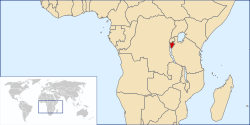Kingdom of Burundi
| Kingdom of Burundi | ||||||||
| Royaume du Burundi | ||||||||
| Independent state (17th century–1890) Part of German East Africa (1890–1916) Part of Ruanda-Urundi (1916–1962) Independent state (1962–1966) |
||||||||
|
||||||||
|
||||||||
|
Motto Imana, Umwan, Uburundi Dieu, le Roi et le Burundi "God, the King and Burundi" |
||||||||
|
Anthem Burundi bwacu (Our Burundi) |
||||||||
|
Territory of the Kingdom of Burundi in 1966.
|
||||||||
| Capital |
Gitega Bujumbura |
|||||||
| Languages | Kirundi, French | |||||||
| Government | Monarchy | |||||||
| Mwami | ||||||||
| • | 1680–1709 | Ntare I (first) | ||||||
| • | 1966 | Ntare V (last) | ||||||
| Prime Minister | ||||||||
| • | 1961 | Joseph Cimpaye (first) | ||||||
| • | 1966 | Michel Micombero (last) | ||||||
| Historical era | Cold War | |||||||
| • | Established | 17th century | ||||||
| • | German East Africa | July 1, 1890 | ||||||
| • | Ruanda-Urundi | July 20, 1922 | ||||||
| • | Autonomy | December 21, 1961 | ||||||
| • | Independence | July 1, 1962 | ||||||
| • | Republic | November 28, 1966 | ||||||
| Area | ||||||||
| • | 1966 | 27,834 km² (10,747 sq mi) | ||||||
| Population | ||||||||
| • | 1966 est. | 3,275,000 | ||||||
| Density | 117.7 /km² (304.7 /sq mi) | |||||||
|
||||||||
The Kingdom of Burundi (French: Royaume du Burundi) or Kingdom of Urundi (Royaume d'Urundi) was a polity ruled by a traditional monarch in modern-day Republic of Burundi in the Great Lakes region of East Africa. The kingdom, majority ethnic Hutu, was ruled by a monarch from the Tutsi ethnic group with the title of mwami. Created in the 17th century, the kingdom was preserved under European colonial rule in the late 19th and early 20th century and was an independent state between 1962 and 1966.
The date of the foundation of the Kingdom of Burundi is unknown but probably dates back to the 17th century when the Tutsi ethnic group gained dominance over the larger ethnic Hutu population of the region. Under mwami Ntare I (r.1675–1705), the kingdom expanded and annexed a number of surrounding polities. Although ruled by the mwami, the kingdom was extensively decentralised and local sub-rulers had wide independence. Before the arrival of European colonists, succession struggles were also common.
In 1890, Burundi became part of the German colonial empire as part of German East Africa but was not effectively occupied or controlled by the colonial power. During World War I, Belgian troops from the neighbouring Belgian Congo invaded the region and occupied it. The Belgians were awarded Burundi, together with the neighbouring Kingdom of Rwanda, as an international mandate by the League of Nations. The Belgians, however, preserved many of the kingdom's institutions intact.
...
Wikipedia



